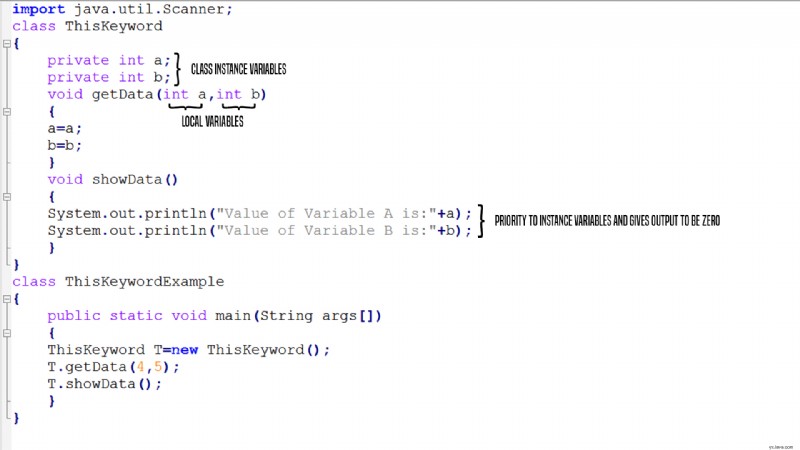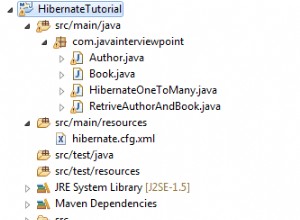Java - cette référence
cet objet
ceci est un objet qui contient la référence d'un autre objet qui invoque la fonction membre.
Considérez le programme :
import java.util.Scanner;
class ThisKeyword
{
private int a;
private int b;
void getData(inta,int b)
{
a=a;
b=b;
}
void showData()
{
System.out.println("Value of Variable A is:"+a);
System.out.println("Value of Variable B is:"+b);
}
}
class ThisKeywordExample
{
public static void main(String args[])
{
ThisKeyword T=new ThisKeyword();
T.getData(4,5);
T.showData();
}
}
Sortie
Value of Variable A is:0 Value of Variable B is:0
Explication de la sortie.

le corps de la méthode getData(), le compilateur ne sait pas s'il doit donner la priorité aux variables d'instance ou à Variables locales et c'est pourquoi dans la méthode showData() , le compilateur donne la priorité aux variables d'instance et donne une sortie égale à zéro.
Nous pouvons éviter cela en utilisant cette variable de référence dans la méthode getData() comme suit :
this.a=a; this.b=b;
Lorsque l'objet T invoque la méthode getData(), cette référence est remplacée par la référence de l'objet T de sorte que :
T.a=a; T.b=b;
Ainsi, T.a est les variables d'instance et a est la variable locale telle que définie dans le paramètre de la méthode getData().
PublicitéConsidérez le programme :
import java.util.Scanner;
class ThisKeyword
{
private int a;
private int b;
void getData(int a,int b)
{
this.a=a;
this.b=b;
}
void showData()
{
System.out.println("Value of Variable A is:"+a);
System.out.println("Value of Variable B is:"+b);
}
}
class ThisKeywordExample
{
public static void main(String args[])
{
ThisKeyword T=new ThisKeyword();
T.getData(4,5);
T.showData();
}
}
Sortie
Value of Variable A is:4 Value of Variable B is:5
Considérons un autre exemple où nous utiliserons ceci mot-clé différemment.
Notre objectif principal dans le programme suivant est de savoir qui est l'aîné parmi deux personnes, nous mettrons en œuvre ce programme à l'aide de ce mot-clé .
Publicité
import java.util.Scanner;
class Person
{
private String name;
private int age;
Scanner KB=new Scanner(System.in);
void getPerson()
{
System.out.println("Enter the Name of the Person:");
name=KB.nextLine();
System.out.println("Enter the Age of the Person:");
age=KB.nextInt();
}
void putPerson()
{
System.out.println("Name: "+name);
System.out.println("Age: "+age);
}
Person WhoIsElder(Person P)
{
if(P.age>age)
{
return P;
}
else if(P.age==age)
{
return null;
}
else
{
return this;
}
}
}
class ElderPerson
{
public static void main(String args[])
{
Person P1=new Person();
P1.getPerson();
Person P2=new Person();
P2.getPerson();
Person ReferenceHolder;
ReferenceHolder=P1.WhoIsElder(P2);
if(ReferenceHolder==null)
{
System.out.println("Both the Persons have Same Age");
}
else
{
System.out.println("Elder Person :");
ReferenceHolder.putPerson();
}
}
}
Sortie
Enter the Name of the Person: Mayank Singh Enter the Age of the Person: 18 Enter the Name of the Person: Amit Shukla Enter the Age of the Person: 17 Elder Person : Name :Mayank Singh Age :18
Si les deux personnes ont le même âge, sortie :
Enter the Name of the Person: Mayank Singh Enter the Age of the Person: 18 Enter the Name of the Person: Amit Shukla Enter the Age of the Person: 18 Both the Person have Same Age



